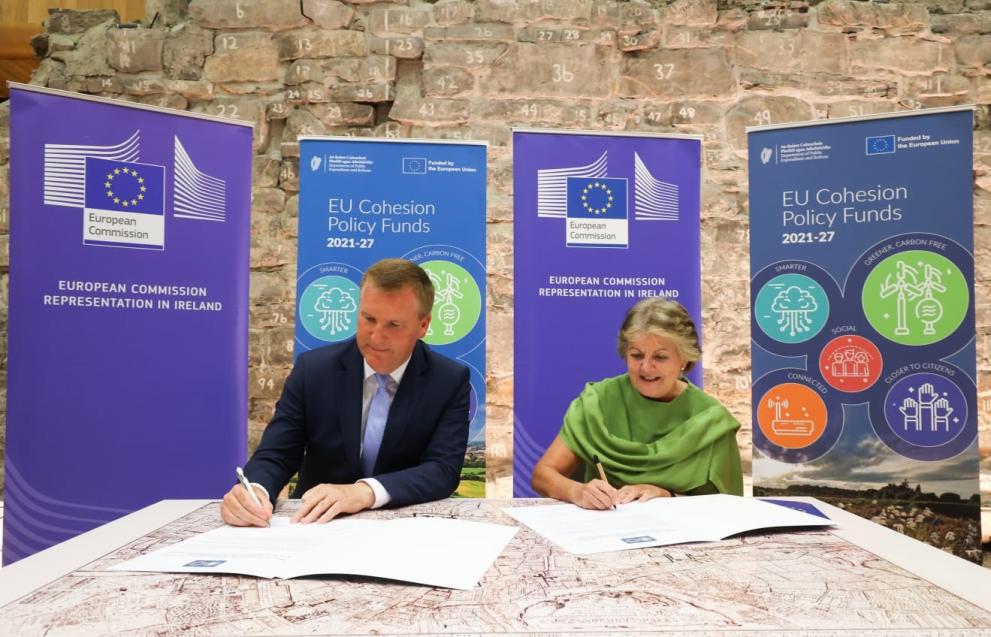
The details and strategy for these investments are set out in the Partnership Agreement between Ireland and the Commission that is formally launched today.
These EU funds will help Ireland address regional disparities by boosting innovation and competitiveness, enabling the economy's digital transformation, investing in social inclusion, skills training and employment, and in the green transition.
Green transition, innovation and cross-border cooperation
€396 million from the European Regional Development Fund (ERDF) will strengthen regional innovation ecosystems by improving the capacities of the newly created ‘Technical Universities', which will function as regional knowledge hubs. Funds will also be invested to increase energy efficiency in housing, thereby helping families at risk of energy poverty, whilst contributing to the green and fair transition.
ERDF will also be of a great help for the revitalisation of town centres. The investments will improve the appearance and livability of medium sized and smaller towns in Ireland, in line with the principles of the New European Bauhaus.
Additionally, €293 million will be allocated to European cross-border cooperation programmes for joint development and peace activities in the Northern Periphery and Atlantic areas and with Northwest Europe.
Finally, €84 million from the Just Transition Fund (JTF) will support Ireland's Midlands addressing the impact of the transition out of peat for electricity generation.
Employment and social inclusion
€508 million from the European Social Fund Plus (ESF+) will contribute to the implementation of the European Pillar of Social Rights Action Plan and contribute to achieving EU-level social headline targets.
Over half of the ESF+ envelope will contribute to reducing the risk of poverty and social exclusion, with an emphasis on disadvantaged groups. More than 20,000 vulnerable children will benefit from improved access to social services tailor-made to their individual needs. To facilitate the social and employment integration of disadvantaged communities of people with a migrant background, the ESF+ will also finance mentoring, language and social skills training.
ESF+ funding will also improve the chances of people to get a job by providing training to up-and reskill, lifelong learning, and education measures. There will be a focus on assisting people who face greater challenges on the labour market, including over 6,000 persons with disabilities. In total, the programme aims to help 90,000 jobseekers to participate in a training course to develop new skills by 2029.
Sustainable fisheries, aquaculture and processing sector
Around €142 million from the European Maritime Fisheries and Aquaculture Fund (EMFAF) will enable the adaptation of the Irish fishing and aquaculture sectors to the present challenges. The funding will support the implementation of the Common Fisheries Policy, the growth of a sustainable blue economy and healthy, safe and sustainably management of seas and oceans. Investments in the fisheries and aquaculture sectors will also contribute to the green transition in Ireland, by promoting development of small-scale coastal fisheries through community-led local development.
Members of the College said:
Commissioner for Cohesion and Reforms, Elisa Ferreira, said: “Following today's adoption of the Partnership Agreement, Ireland will receive support to further develop its economy in a fair and green manner, ensuring that no region is left behind. Since its accession to the EU in 1973, the country has benefitted from Cohesion Policy funds to support its transformation to a modern, innovation-led economy. Support under this new Partnership Agreement will continue to boost innovation across Irish regions, while also contributing to the green transition and to the quality of life in Irish towns. Ireland has a far-reaching smart, green and digital future ahead.”
Background
Under Cohesion Policy, and in cooperation with the Commission, each Member State prepares a Partnership Agreement, a strategic document for programming investments from the Cohesion Policy funds – ERDF, ESF+, and the Cohesion Fund – the JTF and the EMFAF during the Multiannual Financial Framework.
The Partnership Agreements focus on EU priorities, laying down the strategy and investment priorities identified by each Member State. They present a list of National and Regional Programmes adapted to the needs of the country for implementation of the investments on the ground, including the indicative annual financial allocation for each programme.
The Partnership Agreement with Ireland is the 22nd to be adopted following those of Greece, Germany, Austria, Czechia, Lithuania, Finland, Denmark, France, Sweden, the Netherlands, Poland, Bulgaria, Cyprus, Portugal, Estonia, Slovakia, Italy, Romania, Croatia, Slovenia and Malta.
More information
2021-2027 long-term EU budget & NextGenerationEU
Questions and Answers on the EU Cohesion Policy legislative package 2021-2027
Details
- Publication date
- 20 September 2022
- Author
- Representation in Ireland
